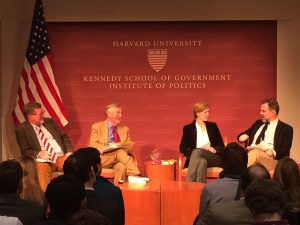On March 22, the HKS community gathered in the JFK Jr. Forum for a discussion on the future of U.S.-China relations. The event was moderated by HKS professor Arne Westad and featured Graham Allison (director of the Belfer Center for Science and International Affairs), Niall Ferguson (Senior Faculty Fellow at the Belfer Center), and Samantha Power (former U.S. Ambassador to the UN).
The discussion revolved around Professor Allison’s upcoming book on the Thucydides Trap, named after the ancient Greek practitioner of applied history. Thucydides believed that the Peloponnesian War resulted from a power struggle between Sparta, an established power, and Athens, a rising power. Taking this idea to the present day, China and the U.S. may be heading toward a Thucydides Trap as well, and it is critical for citizens and policymakers of both countries to understand such dynamics.
Professor Allison said that managing the relationship between the U.S. and China will be the central challenge of our lifetime and that “business as usual could lead to history as usual.” Ambassador Power discussed the “transitional friction” she has witnessed as China asserted itself more on the international scene and in multilateral institutions. Advocating for a stronger sense of “historical perspective” at the highest levels of government, she explained that “enlightened strategic thinking” will be necessary to minimize chances of sparking conflict on either side. Reaching into the historical record, Professor Ferguson explained that there have been several exceptions to the Thucydides Trap, and that it is important to keep two things in mind regarding the U.S.-China case: first, “the U.S. is still miles ahead militarily” and second, “China’s leaders know they don’t need war.”
Professor Allison concluded the session with remarks on Chinese president Xi Jinping and U.S. president Donald Trump. “Both have ambitious agendas at home,” he noted, and both want to “make their countries great again.” Allison encouraged the audience not to fall into a sense of fatalism, but to stand vigilant and to apply the lessons of history to meet the challenges of our time.

